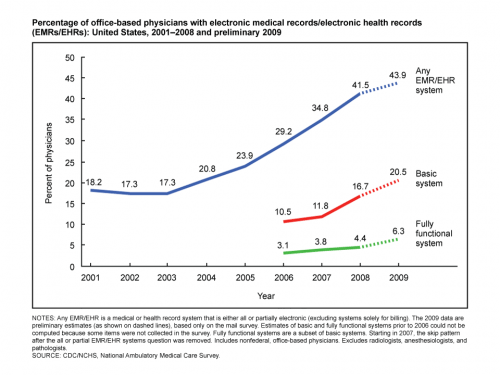- You are here:
- Home »
- Blog »
- Manage Your Computer Business »
- Expanding Your Business Into Healthcare IT

Expanding Your Business Into Healthcare IT
Healthcare IT technicians are in high demand. The USA healthcare job market is booming, and the rush to go electronic is placing large demands on finding the knowledgeable and competent IT professionals that can meet the challenges of implementing, maintaining, and securing Electronic Health Record/Electronic Medical Record (EHR/EHR) systems. Even though large hospitals likely have IT departments on-site, they will most likely spend money on EHR/EMR consultants to make sure implementations run as smoothly as possible. The shift to electronic medical records has been difficult for the smaller clinics and private practices since they don’t have large budgets and likely don’t have a dedicated on-site IT staff. These factors present great opportunities for small IT shops and consultants.
I can speak mainly about the US healthcare market and government regulations, however those of you who are in other countries may be able to benefit from the US healthcare overhaul, especially if your country has widespread EMR implementation already. If you can bring any experience and knowledge to the table, you would be wise to tap into the US healthcare IT consultant market.
Current situation and types of systems
I was recently manning our (Global 360) vendor booth at the annual NYHIMA (New York Health Information Management Association) convention in Rye Brook, NY. The majority of attendees are Health Info Management (HIM) Directors, followed by coders and compliance professionals. The vast majority of HIM directors I talked with said their organization is using a hybrid medical record, meaning they are working out of both an EMR system as well as paper. Many of these are using multiple systems to retrieve and store data, making the entire work-flow process cumbersome.
Interoperability is a major problem when using multiple systems, and HIM directors have no problem complaining to me about these problems. Many hospitals and clinics are totally paper and still searching for the “perfect” EHR/EMR for their organization. Considering that the major EMR’s can cost around $75,000 per license, this is no small undertaking! A 500 bed hospital that chooses a proprietary EMR such as EPIC, McKesson, or Cerner can easily spend 50 million dollars on full EMR implementation.
Cloud based systems cost less and can provide easier administration, but the benefits and risks of an internet base EMR need to be fully assessed. Many providers have adopted this type of infrastructure despite the risks. Open source systems can also provide a significant cost benefit, but many times requires specialized personnel to administer and create custom modules. One of the most popular open source systems is VistA, created by the United States Veterans Health administration and is used at VA hospitals throughout the country.
Regulations that you need to know
The US healthcare industry is complicated, to say the least. Over the past few years there have been many government initiatives to promote hospitals, healthcare institutions, and private practices to make to move from paper to electronic medical records. I will give a quick overview of the most important regulations that any consultancy will need to know about if they want to compete in the healthcare IT arena.
HIPAA – The Health Insurance Portability and Accountability Act are regulations that protect patient information and privacy. The rules are broad and sometimes vague, for example, it states that any off-site backups that contain patient data must be encrypted. It doesn’t mention what kind of encryption or how strong the encryption must be. If you work with any kind of protected health information (PHI) is the USA then you must have a basic understanding of HIPAA regulations.
ARRA – The American Reinvestment and Recovery Act of 2009 was the stimulus act enacted by the US congress. The money set aside for healthcare was impressive, well over $100 billion total, specifically: $25.8 billion for healthcare IT investments and incentive payments, $86.8 billion for Medicaid, and $1 billion for the Veterans Health administration. The caveat to this stimulus money is that institutions will receive this money in increments after meeting certain government instituted criteria. Which leads us to….
Meaningful Use – The ever important, ever changing, and ever complicated meaningful use criteria. Mention these two words to any HIM director or healthcare CIO and you will see stress personified. The American Recovery and Reinvestment Act of 2009 (ARRA) specifies three main components of Meaningful Use:
- The use of a certified EHR in a meaningful manner, such as e-prescribing.
- The use of certified EHR technology for electronic exchange of health information to improve quality of health care.
- The use of certified EHR technology to submit clinical quality and other measures.
Simply put, “meaningful use” means providers need to show they’re using certified EHR technology in ways that can be measured significantly in quality and in quantity. If the providers do not meet the criteria for meaningful use then they will not receive the stimulus payments. (https://www.cms.gov/EHRIncentivePrograms/30_Meaningful_Use.asp#BOOKMARK1)
A recent article detailed how “A new generation of tech-savvy consumers is creating a new market for digital and interactive health.” When the government and consumer created markets increase demands to go electronic, it’s inevitable that the future of healthcare will be digital. Those technicians with specialized skills in medical work-flow, medical technology, and security will reap the benefits of the healthcare overhaul.
IT specialists that have an understanding of physician practice and hospital work-flow systems are in very high demand. Real world experience is always best, but the HIT consultant would highly benefit from specialized certifications or education. CompTIA has just released its new Healthcare IT Technician certificate that is targeted towards a technician with “500 hours of hands-on IT technical experience in the lab or field, plus the knowledge/skills necessary to deploy and support healthcare IT systems in clinical settings.”
HIMSS has the CPHIMS certification that is more project management based and targeted towards CIO’s and IT project managers. AHIMA is also coming out with some new certifications, but they are still in beta as of this writing. If you are in college for IT/technology, a minor in healthcare could definitely help you get in the door in this highly competitive environment.
The US predicts that healthcare will account for 1/5th of the US GDP by 2019. Healthcare institutions are scrambling to reach meaningful use of electronic systems so they can benefit from the stimulus payments. HIT specialists will continue to play a major role in the industry and the future of healthcare itself. There is a long road ahead and we have barely scratched the surface of EMR implementations and fully integrated electronic systems. This is a very important and expansive topic to cover and I hope that many of you will take the steps necessary to enter this market. The healthcare sector could definitely be a lucrative vertical for your company. Stay tuned for more in-depth technical HIT articles in the future!

Source: Preliminary 2010 27% physician practices using either full or partial EMR
| Measure | All Physicians |
||
| 2009 | 2010 | Change | |
| 1. Physicians with EMRs | 39.3% | 42.8% | 3.5% |
| 2. Physicians with ‘qualified’ EMRs | 7.3% | 10.7% | 3.4% |
| 3. Physicians who are e-presribing | 23.9% | 28.5% | 4.6% |
Please feel free to leave comments and/or ask a questions.
For further reading and information:
HIMSS
AHIMA
Healthcare IT news
Session expired
Please log in again. The login page will open in a new tab. After logging in you can close it and return to this page.

very informative post, thanks for sharing it.
This is an excellent post! Please, bring us more!
I note you say you are in USA, but also your address in in Australia. I was thinking of trying to call in to say hi when next in Melbourne…, don’t think I’ll be coming to USA anytime soon.
Very good topic. I have a few customers who are small medical offices and they are overwhelmed with the new government regulations. I am sure that one of the offices will close in the next year if thee is not substantial cuts in Obamacare. The overhead is very costly and the benefits are nearly zero. Absolutely no efficiency gain. I support the computer systems and networks but the “solutions” are sold by other specialized companies.
One real opportunity for us is to provide consultation to the businesses to help them understand what they are signing up for. I read one of the contracts that a doctor was trying to get out of and it was obvious that the doctor should nevert have entered into the agreement because the solution provider was not truly obligated to privide anything other than access to their system and software. There was no performance guarantee at all!
Medical staff are not generally very knowledgeable about IT and are being taken advanatge of. Sad.
It could have been an interesting article, but did it need to be so American-centric? Technibble does have a readership outside the US!
Sys-eng, right on! A lot of practices purchase unnecessary equipment.
Compunurse, I am familiar with HITECH. Grab all the knowledge you can get. Good luck!
Very informative article. I’m an RN who works in the informatics field. There is a big push in the US for implementation of electronic medical records. Those interested in certification, I’m taking a national course called HITECH (Health Information Technology for Economic and Clinical Health Act). It’s through local community colleges. It runs about $400 dollars but the govt will reimburse if completed under 6 months. You can choose many different roles. Mine is software support. Overall it gives a nice overveiw of the EMR initiative.
@Rob: The general topic discussed will apply to everyone though the details and regulations might be different in your neck of the woods. TN is a pretty global community, but I don’t see any harm in sharing information that might be more geared to a particular segment of the readers than others. I think it’s better to share it than not. Wouldn’t you agree?
A good life long friend of mine who owns a small medical software company (200 employees) told me a month ago that the IT medical field is terrible for getting into right now. Business is way down. This friend is a guy who has sold millions of dollars per year of IT services to the medical world for over 20 years. I believe him with all the years of experience he has.
Thanks for the informative post, its nice to hear how things are done in the US, the system is different here in the UK.
The entire health system is government run (Social Security)as apposed to run as a business, hence this effects all the contractors and providers right up the scale.
Sean,
That’s interesting. I like to get the perspectives from other countries. Like I said, we could probably learn from each others implementations.
Very interesting! I had no idea that the healthcare IT field could be so in depth. Thanks for the great information, keep it coming.
You made some really good suggestions there. I did a hunt on the niche and discovered the majority of people could recognize through your blog.
Thanks for sharing, you helped me decided what i am going to study for my masters degree